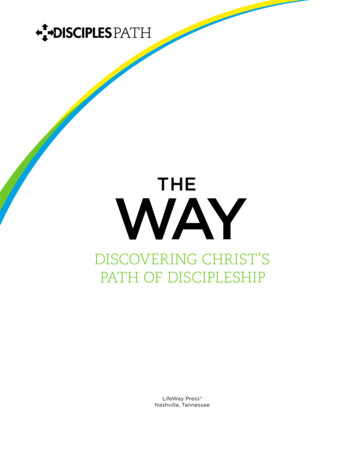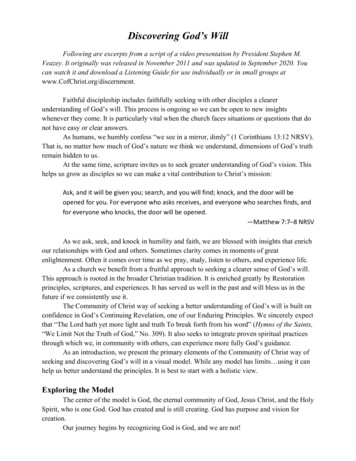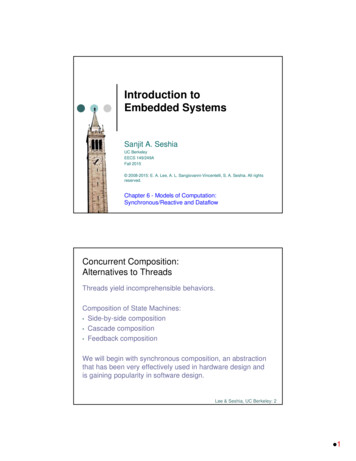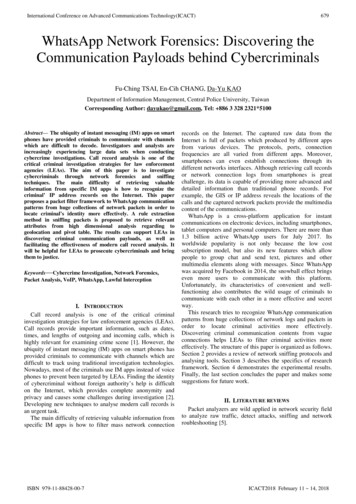
Transcription
THEWAYDISCOVERING CHRIST’SPATH OF DISCIPLESHIPLifeWay Press Nashville, Tennessee
2015 LifeWay Press Disciples Path is a series of studies founded on Jesus’ modelof discipleship. Created by experienced disciple makers acrossthe nation, it offers an intentional pathway for transformationaldiscipleship and a way to help followers of Christ move from newdisciples to mature disciple makers. Each study in the series isbuilt on the principles of modeling, practicing, and multiplying:No part of this work may be reproduced or transmitted in any formor by any means, electronic or mechanical, including photocopyingand recording, or by any information storage or retrieval system,except as may be expressly permitted in writing by the publisher.Requests for permission should be addressed in writing to LifeWayPress ; One LifeWay Plaza; Nashville, TN 37234-0152.Item: 005693131 ISBN: 978-1-4300-3651-7Dewey decimal classification number: 248.84Subject heading: DISCIPLESHIP \ JESUS CHRIST \ CHRISTIAN LIFE Leaders model the life of a biblical disciple.Eric GeigerVice President, LifeWay Resources Disciples follow and practice from the leader.Rick HowertonDiscipleship Specialist Disciples become disciple makers and multiplySam O’Neal, Joel PolkContent Editorsthrough the Disciples Path.Each study in the series has been written and approved byBrian Daniel,Manager, Discipleship Publishingdisciple-makers for small groups and one-on-one settings.Michael KelleyDirector, Groups MinistryContributors:We believe that the Bible has God for its author; salvation for itsend; and truth, without any mixture of error, for its matter and thatall Scripture is totally true and trustworthy. To review LifeWay’sdoctrinal guideline, visit www.lifeway.com/doctrinalguideline.Eddy Pearson, the Arizona Southern Baptist ConventionBen Reed, Saddleback Church, Lake Forest, CAAll Scripture quotations are taken from the Holman ChristianStandard Bible , copyright 1999, 2000, 2002, 2003, 2009 by HolmanBible Publishers. Used by permission.To order additional copies of this resource, write to LifeWayResources Customer Service; One LifeWay Plaza; Nashville, TN37234-0113; fax 615.251.5933; call toll free 800.458.2772; orderonline at www.lifeway.com; email orderentry@lifeway.com; orvisit the LifeWay Christian Store serving you.Printed in the United States of AmericaFor helps on how to use Disciples Path, tips on how tobetter lead groups, or additional ideas for leading thisstudy, visit: www.ministrygrid.com/web/disciplespathGroups Ministry Publishing, LifeWay ResourcesOne LifeWay Plaza; Nashville, TN 37234-0152
CONTENTSA NOTE FOR DISCIPLE MAKERS 4WHAT IS A DISCIPLE? 5HOW TO USE THIS RESOURCE 6SESSION 1DEFINING A DISCIPLE 8SESSION 2JESUS CALLS HIS DISCIPLES 22SESSION 3JESUS TEACHES HIS DISCIPLES 36SESSION 4JESUS EQUIPS HIS DISCIPLES 50SESSION 5JESUS SENDS HIS DISCIPLES 64THE DISCIPLES PATH STRATEGY 78LEADER INSTRUCTIONS 80
A NOTE FOR DISCIPLE MAKERSSeveral years ago I was part of a massive research study that sought to discover how the Lord oftenbrings about transformation in the hearts of His people. The study became a book called TransformationalDiscipleship. Basically, we wanted to learn how disciples are made. Based on the study of Scriptureand lots of interactions with people, we concluded that transformation is likely to occur when a godlyleader applies truth to the heart of a person while that person is in a teachable posture. LEADER: You are the leader. As you invest in the people you’re discipling, they will learn muchabout the Christian faith by watching you, by sensing your heart for the Lord, and by seeing youpursue Him. I encourage you to seek to be the type of leader who can say, “Follow my example asI follow the example of Christ.” TRUTH: All six studies in the Disciples Path series were developed in deep collaboration withministry leaders who regularly and effectively disciple people. The studies are designed to takethe people you disciple into the Word of God—because we’re confident that Jesus and His Wordsanctify us and transform us. Our community of disciple-makers mapped out a path of the truthswe believe are essential for each believer to know and understand. POSTURE: Hopefully the people you will be investing in adopt a teachable posture—one that isopen and hungry for the Lord. Encourage them to take the study seriously and to view your invitationto study together as a sacred opportunity to experience the grace of God and the truth of God.We hope and pray the Lord will use this study in your life and the lives of those you disciple. As you applythe truth of God to teachable hearts, transformation will occur. Thank you for being a disciple-maker!In Christ,Eric GeigerVice President at LifeWay Christian ResourcesCo-author of Transformational Discipleship4The Way
WHAT IS A DISCIPLE?Congratulations! If you’ve chosen to live as a disciple of Jesus, you’ve made the most important decisionimaginable. But you may be wondering, What does it mean to be a disciple?To put it simply, a disciple of Jesus is someone who has chosen to follow Jesus. That’s the command Jesus gaveto those He recruited as His first disciples: “Follow Me.” In Jesus’ culture, religious leaders called rabbis wouldgather a group of followers called disciples to follow in their footsteps and learn their teachings. In the sameway, you will become more and more like Jesus as you purposefully follow Him in the weeks to come. Jesusonce said, “Everyone who is fully trained will be like his teacher” (Luke 6:40).On a deeper level, disciples of Jesus are those learning to base their identities on Jesus Himself. All of us usedifferent labels to describe who we are at the core levels of our hearts. Some think of themselves as athletesor intellectuals. Others think of themselves as professionals, parents, leaders, class clowns, and so on.Disciples of Jesus set aside those labels and base their identities on Him. For example: A disciple of Jesus is a child of God. In the Bible we find these words: “Look at how great a lovethe Father has given us that we should be called God’s children. And we are!” (1 John 3:1). We areGod’s children. He loves us as our perfect Father. A disciple of Jesus is an alien in this world. Disciples of Jesus are aliens, or outsiders, in their owncultures. Because of this identity, Jesus’ disciples abstain from actions and activities that are contrary toHim. Peter, one of Jesus’ original disciples, wrote these words: “Dear friends, I urge you as strangers andtemporary residents to abstain from fleshly desires that war against you” (1 Pet. 2:11). A disciple of Jesus is an ambassador for Christ. Another of Jesus’ disciples recorded these wordsin the Bible: “Therefore, if anyone is in Christ, he is a new creation; old things have passed away, andlook, new things have come. Therefore, we are ambassadors for Christ, certain that God is appealingthrough us. We plead on Christ’s behalf, ‘Be reconciled to God’ ” (2 Cor. 5:17,20). Ambassadors representtheir king and country in a different culture for a specified period of time. Because we have been transformed by Jesus and are now His disciples and ambassadors, we represent Him to the world through ouractions and by telling others about Him.The journey you are about to take is one that will transform you more and more to be like Jesus. Enjoy! No oneever loved and cared for people more passionately than Jesus. No one was ever more sincere in His concern forothers than Jesus. And no one ever gave more so that we could experience His love than Jesus did on the cross.As you grow to be more like Jesus, you’ll find that your relationships are stronger, you have more inner peacethan ever before, and you look forward to the future as never before.That’s the blessing of living as a disciple of Jesus. 5
HOW TO USE THIS RESOURCEWelcome to The Way. By exploring the journey of Jesus’ earliest disciples, both new and establishedChristians will gain a better understanding of what it means to follow Christ. As you get started,consider the following guides and suggestions for making the most of this experience.GROUP DISCUSSIONBecause the process of discipleship always involves at least two people—the leader and the disciple—each session of The Way includes a practical plan for group engagement and discussion.This plan includes the following steps: GET STARTED. The first section of the group material helps you ease into the discussion bystarting on common ground. You’ll begin by reflecting on the previous session and your recentexperiences as a disciple. After spending time in prayer, you’ll find a practical illustration to helpyou launch into the main topic of the current session. THE STORY. While using Disciples Path, you’ll find opportunities to engage the Bible throughboth story and teaching. That’s why the group time for each session features two main sections:Know the Story and Unpack the Story. Know the Story introduces a biblical text andincludes follow-up questions for brief discussion. It’s recommended that your group encounter thebiblical text by reading it out loud. Unpack the Story includes practical teaching material anddiscussion questions—both designed to help you engage the truths contained in the biblical text.To make the most of your experience, use the provided material as a launching point for deeperconversation. As you read through the teaching material and engage the questions as a group, bethinking of how the truths you’re exploring will impact your everyday life. ENGAGE. The group portion of each session ends with an activity designed to help you practicethe biblical principles introduced in Know the Story and more fully explored in Unpack theStory. This part of the group time often appeals to different learning styles and will push you toengage the text at a personal level.6The Way
INDIVIDUAL DISCOVERYEach session of The Way also includes content for individual use during the time between groupgatherings. This content is divided into three categories:Worship: features content for worship and devotion. These activities provide opportunities for youto connect with God in meaningful ways and deepen your relationship with Him.Personal study: features content for personal study. These pages help you gain a deeperunderstanding of the truths and principles explored during the group discussion.Application: features content for practical application. These suggestions help you take action basedon the information you’ve learned and your encounters with God.Note: Aside from the Reading Plan, the content provided in the Individual Discovery portionof each session should be considered optional. You’ll get the most out of your personal studyby working with your group leader to create a personalized discipleship plan using the WeeklyActivities checklist included in each session.ADDITIONAL SUGGESTIONS Y ou’ll be best prepared for each group discussion or mentoring conversation if you read thesession material beforehand. A serious read will serve you most effectively, but skimming theGet Started and The Story sections will also be helpful if time is limited. T he deeper you’re willing to engage in the group discussions and individual discovery eachsession, the more you’ll benefit from those experiences. Don’t hold back, and don’t be afraidto ask questions whenever necessary. A s you explore the Engage portion of each session, you’ll have the chance to practice differentactivities and spiritual disciplines. Take advantage of the chance to observe others during thegroup time—and to ask questions—so that you’ll be prepared to incorporate these activities intoyour private spiritual life as well. Visit lifeway.com/disciplespath for a free PDF download that includes leader helps for The Wayand additional resources for disciple-makers. 7
SESSION 1DEFININGA DISCIPLETo be a disciple of Jesus is to participate inGod’s redemptive mission for the world.
GET STARTEDREFLECTWelcome to The Way. The goal of this resource is to help you explore the process of growing andmaturing as a disciple of Jesus. Throughout the following sessions, we’ll examine the journey of Jesus’own disciples through different passages from the Gospels. In this session, we’ll begin by gaining abetter understanding of what a disciple is and what it means to live each day as a disciple of Christ.Use the following questions to begin the session with discussion.What are some words our culture uses to describe those who chooseto live as disciples of Jesus?What are some words that describe your own experiences while livingas a disciple of Jesus?In what ways would you most like to grow and mature in your effortsto follow Jesus?PRAYTake a break from your discussion to approach God in prayer. Use the following guidelines as youconnect with Him: T hank God for the opportunity to join with other disciples of Christ in order to gain a betterunderstanding of what it means to live as a disciple. Praise God for the ways He has worked in your life. Ask for wisdom for all present as you engage God’s Word.Defining a Disciple9
INTRODUCTIONThe English language has a lot of quirks. There are bunches of rules and principles that aresupposed to keep things separated and in order. Yet many times those rules and principlesoverlap in strange ways—even sometimes contradicting one another.For example, did you know many English words can be used as both nouns and verbs?Think of a farmer milking a cow. The word milk acts as a verb in such situations; to“milk” a cow is an action that involves specific steps. But what do you get after the cowhas been milked? You get milk, of course—milk as a noun. The same word goes in twoseparate directions.Other words follow the same pattern. You might smell (verb) something wonderful inyour kitchen and recognize it as the smell (noun) of baking bread. You can use a hammer(noun) to hammer (verb) nails into a board. Strange as it may sound, it’s entirely possibleto chant a chant, broadcast a broadcast, and drink a drink.Disciple is another word that can go in two directions at once. Those who haveexperienced salvation live and breathe each day as disciples of Jesus Christ. In this way,the word disciple defines who we are as Christians. At the same time, the term also definesmuch of what we do as Christians. As followers of Jesus, we’re called to disciple lessmature Christians by helping them grow in their relationships with Christ—even as we arediscipled by others.This process is called “discipleship,” and it’s one of the primary goals of this resource. As youengage the pages to come, you’ll learn what it means to find your identity as a discipleof Jesus. You’ll also learn (and experience) the benefits of discipleship in the context ofdeeper relationships with other Christians.How would you summarize in your own words what it meansto be a disciple of Jesus Christ?What questions do you have about the meaning and processof discipleship?10The Way
THE STORYKNOW THE STORYJohn the Baptist was a man with a mission. He had been charged by God to prepare theway for the Messiah—for Jesus. The following story highlights Jesus’ mission for the world.It also helps us gain a sense of our place in that mission as disciples of Christ.The next day John saw Jesus coming toward him and said,“Here is the Lamb of God, who takes away the sin of the world!30This is the One I told you about: ‘After me comes a man who hassurpassed me, because He existed before me.’ 31 I didn’t know Him,but I came baptizing with water so He might be revealed to Israel.”29And John testified, “I watched the Spirit descending fromheaven like a dove, and He rested on Him. 33 I didn’t know Him,but He who sent me to baptize with water told me, ‘The One yousee the Spirit descending and resting on—He is the One whobaptizes with the Holy Spirit.’ 34 I have seen and testified that Heis the Son of God!”32Again the next day, John was standing with two of hisdisciples. 36 When he saw Jesus passing by, he said, “Look! TheLamb of God!” 37 The two disciples heard him say this andfollowed Jesus. 38 When Jesus turned and noticed them followingHim, He asked them, “What are you looking for?” They said toHim, “Rabbi” (which means “Teacher”), “where are You staying?”39“Come and you’ll see,” He replied. So they went and saw whereHe was staying, and they stayed with Him that day. It was about10 in the morning.35Andrew, Simon Peter’s brother, was one of the two who heardJohn and followed Him. 41 He first found his own brother Simonand told him, “We have found the Messiah!” (which means“Anointed One”), 42 and he brought Simon to Jesus.40JOHN 1:29-42What do these verses teach us about Jesus?Defining a Disciple11
UNPACK THE STORYJESUS HAS A MISSION FOR THE WORLDWe’re exploring the question: What does it mean to be a disciple of Jesus? Interestingly,the best way to answer that question is to focus not on the concept of a “disciple,” but onthe identity of Jesus. In order to understand what it means to live as followers of Jesus,we must first have a proper view of Jesus Himself.What are some different ways people define Jesus today?How would you express or explain who Jesus is?Jesus came tofix the problemof sin. His deathand resurrectionopened the doorfor redemption—they allow usto experienceforgiveness forour sins and livein a restored(or redeemed)relationshipwith God. This isthe gospel.John the Baptist offered several identifying factors for Jesus. For example, John claimedthat Jesus existed before him, even though John was older than Jesus by several months(see Luke 1). More importantly, John identified Jesus as “the Lamb of God,” “the Son ofGod,” and “the One who baptizes with the Holy Spirit.”All of these factors point to a vital truth: Jesus is more than a regular person. In fact, Jesusis God in human flesh. One of the foundational concepts of Christianity is the doctrineof the incarnation, which states that Jesus is both fully God and fully human. Jesus’ timeon earth involved the fullness of God interacting with humanity and all of creation bothphysically and historically.Jesus didn’t come to earth for a vacation, however. He had a purpose. He had a mission.And it was this mission John the Baptist referenced when he saw Jesus for the first time:“Here is the Lamb of God, who takes away the sin of the world!” (v. 29).The world has been broken and corrupted by sin. We as individuals are broken andcorrupted by sin. But Jesus came to fix the problem of sin. His death and resurrectionopened the door for redemption—they allow us to experience forgiveness for our sinsand live in a restored (or redeemed) relationship with God. This is the gospel.Where have you seen evidence of Jesus’ mission?12The Way
DISCIPLES PARTICIPATE IN JESUS’ MISSION FOR THE WORLDTo live as disciples of Jesus, we must first understand His redemptive mission for theworld. As with most things, however, it’s not enough for us to simply understand Jesus’redemptive mission for the world. We must go further. We must take action. Indeed, to bea disciple of Jesus is to participate in His mission and purpose for the world.Notice from our Scripture focus that John the Baptist wasn’t content with recognizingJesus as “the Lamb of God.” John took pains to publicly proclaim the truth about Jesus onmultiple occasions. He took action in order to participate in Jesus’ mission and purpose.And his participation produced fruit—men who had been following John were rightlyconvinced to follow Jesus, instead (see vv. 37-39).In a similar way, verse 40 shows how Andrew—one of the two men who had beenfollowing John—participated in Jesus’ mission by sharing the good news with his brother,Simon. Andrew’s efforts went beyond words. He brought Simon to Jesus so that hisbrother could experience the truth for himself.How would you describe your experiences of talking withothers about Jesus?In addition to evangelism, what are some other ways we canparticipate in Jesus’ mission for the world?As you read through Scripture—and as you work through the pages of this resource—you’ll notice that Jesus’ disciples rarely engage His mission as individuals. Instead,followers of Christ typically work together in relationship with one another as they seekto advance His redemptive mission in the world. That was certainly Jesus’ preferenceduring His public ministry. He didn’t recruit converts and then send them out to do Hiswork in isolation. Instead, He gathered disciples to Himself so they could follow Him asa community—even as a family.What are some advantages of working as a team to engageJesus’ mission for the world?Jesus’ disciplesrarely engageHis missionas individuals.Instead, followersof Christ typicallywork togetherin relationshipwith one anotheras they seek toadvance Hisredemptivemission inthe world.Defining a Disciple13
ENGAGEFollowing Jesus is not an individual activity, nor is it something that can be accomplished in isolation—not for long. Instead, living as a disciple of Christ means living within a community of Christians. Thatcommunity extends around the world and throughout time to include the church in all ages and alllocations. On a more practical level, however, your local community includes the fellow disciples youconnect with, worship with, and serve with each week.Take a few minutes to practice living as a community of disciples in the following two ways:1. Pray with one another. Spend several minutes praying together as a group. Talk openly aboutthe major events in your life, including both difficulties and triumphs. Then take turns praying for oneanother specifically and intentionally.2. Connect with one another. Plan a time to meet socially as a group and do something fun,preferably before the next group meeting. Meet at a park, have dinner, watch a movie—anythingthat moves you forward together in community.PRAYER REQUESTS14The Way
WEEKLY ACTIVITIESIn addition to studying God’s Word, work with your group leader to create a plan forpersonal study, worship, and application between now and the next session. Select fromthe following optional activities to match your personal preferences and available time.WorshipRead your Bible. Complete the reading plan on page 16.Spend time with God by engaging the devotional experience on page 17. Connect with God each day through prayer.Personal StudyRead and interact with “Jesus Has a Mission for the World” on page 18.Read and interact with “Disciples Participate in Jesus’ Mission” on page 20.Application Be intentional about making the most of your experiences at church this weekend. Takeadvantage of opportunities to engage other disciples of Jesus in a moremeaningful way. Memorize John 1:29: “The next day John saw Jesus coming toward him and said, ‘Hereis the Lamb of God, who takes away the sin of the world!’ ” When you have an opportunity to participate in Jesus’ mission this week, invite anotherdisciple to join you. Start a journal to record the different ways you engage Jesus’ mission for the worldeach day. This is a great way to remind yourself of that mission and evaluate yourparticipation in it.Other:Defining a Disciple15
WORSHIPREADING PLANRead through the following Scripture passages this week. Use the space provided to record yourthoughts and responses.Day 1Luke 14:25-35Day 2John 15:1-17Day 3John 17:6-19Day 4John 21:15-23Day 5Ephesians 4:17-32Day 62 Timothy 2:1-13Day 72 Timothy 2:14-2616The Way
TO SERVE AND TO GIVEAs you’d expect, Jesus’ earliest disciples had a lot of learning to do about what it meant to follow Him.For example, they spent much of their time in a strange kind of sibling rivalry—they pushed andjockeyed with one another in order to see who would become the greatest in Jesus’ kingdom. Thedisciples knew Jesus was something special and they understood Him to be both majestic and powerful. Therefore, each wanted to position himself to receive the largest portion of reflected majestyand power once Jesus declared Himself to the world as King.Of course, none of that was in Jesus’ plans. And He let them know it:Jesus called them over and said to them, “You know that those who areregarded as rulers of the Gentiles dominate them, and their men of highpositions exercise power over them. 43 But it must not be like that amongyou. On the contrary, whoever wants to become great among you must beyour servant, 44 and whoever wants to be first among you must be a slaveto all. 45 For even the Son of Man did not come to be served, but to serve,and to give His life—a ransom for many.”42MARK 10:42-45We must also be careful of pride and ambition as we seek to follow Jesus—mainly because suchattitudes will damage our relationship with Him. Use the following questions to assess your heart.What factors cause you to feel jealous of or competitive with otherdisciples?In what situations do you feel superior to other people? Why?How do you feel when you intentionally work for the benefit of others?Following Jesus isn’t about notoriety and big rewards—not in this life, anyway. Instead, those who chooseto live as disciples of Christ must constantly give of themselves in order to serve others, as He did.Defining a Disciple17
PERSONAL STUDYJESUS HAS A MISSION FOR THE WORLDWhat does it mean to be a disciple of Jesus? At the core, it means to join with other disciples in orderto participate in His broader mission for the world. To that end, we’ve already seen that Jesus’ missioncenters on His role as the One “who takes away the sin of the world” (John 1:29). But let’s dig a littledeeper into that mission—and into the identify of Jesus Himself—in order to better understand what’sexpected of us as disciples.John the Baptist provides an interesting character study for these themes. While he spent his lifepreparing the way for the Messiah, he didn’t encounter Jesus until the end of his ministry. Yet, we canlearn much from John when it comes to living in light of Jesus’ person and mission.Look at the following passage, for example:Now the people were waiting expectantly, and all of them were debatingin their minds whether John might be the Messiah. 16 John answered themall, “I baptize you with water, but One is coming who is more powerfulthan I. I am not worthy to untie the strap of His sandals. He will baptizeyou with the Holy Spirit and fire. 17 His winnowing shovel is in His hand toclear His threshing floor and gather the wheat into His barn, but the chaffHe will burn up with a fire that never goes out.”15LUKE 3:15-17What can we learn about John the Baptist from these verses?What can we learn about Jesus from these verses?The people of John’s day were looking for the Messiah, a specific term for the Savior of the worldprophesied throughout the Old Testament. John knew the Messiah would be Someone greater thanhimself—Someone with the power to both save people for eternity (“gather the wheat into His barn”)and pronounce judgment for sin (“the chaff He will burn up”).In addition, John understood that the Messiah would grant people access to God’s Spirit. John baptizedpeople with water as a symbol. The Messiah would baptize “with the Holy Spirit and fire.”18The Way
All of this is important because it helps us understand that Jesus’ mission for the world is directlyconnected to His divine authority and divine identity. The reason Jesus can fix the brokenness of theworld is because He created the world. The reason Jesus can provide forgiveness for sin is because Heis God; therefore, He is totally untouched by sin. For these reasons and more, we can feel confident asparticipants in Jesus’ mission.In order to live as disciples of Jesus, we must first fully embrace His identity as God. Thankfully, Jesusmade His identity clear throughout the Scriptures, including here:My sheep hear My voice, I know them, and they follow Me. 28 I give themeternal life, and they will never perish—ever! No one will snatch them out ofMy hand. 29 My Father, who has given them to Me, is greater than all. No oneis able to snatch them out of the Father’s hand. 30 The Father and I are one.27JOHN 10:27-30How did you come to the conclusion that Jesus is God?In a similar way, Jesus wasn’t silent about the nature of His mission for the world. He spoke often of Hispurpose and His goals as Savior.Read the following passages of Scripture and record how theycontribute to your understanding of Jesus’ mission for the world:Mark 10:42-45Luke 4:16-21John 17:1-5Living as a disciple of Jesus means embracing His identity and His mission for the world. Be sure you’vetaken that crucial step as you consider what it means to follow Him each day.Defining a Disciple19
PERSONAL STUDYDISCIPLES PARTICIPATE IN JESUS’ MISSIONIn order to live as disciples of Jesus, we must fully embrace His mission as the divine Savior of the world.But that’s just the first step. In addition to understanding and embracing Jesus’ mission for the world,we must also participate in that mission. We need to get involved.But what does that mean on a practical level? How do we actually go about joining Jesus in Hisredemptive purpose for the world? We’ll spend the remainder of this resource exploring answers tothose questions. Specifically, we’ll focus on four ways Jesus empowers those who follow Him:1. Jesus calls His disciples.2. Jesus teaches His disciples.3. Jesus equips His disciples.4. Jesus sends His disciples.Which item from this list are you most interested in exploring? Why?Before we move forward, however, let’s look at two important truths that will help us gain a deeperunderstanding of what it means to participate in Jesus’ mission for the world. First, our involvement inJesus’ mission goes beyond “participation” in the normal sense of that word. We don’t participate withJesus in the same way we participate in the Parent Teacher Association or a charitable cause—we don’t“pitch in” with Jesus’ mission whenever our schedule opens up.No, t
of discipleship. Created by experienced disciple makers across the nation, it offers an intentional pathway for transformational discipleship and a way to help followers of Christ move from new disciples to mature disciple makers. Each study in the series is built on










